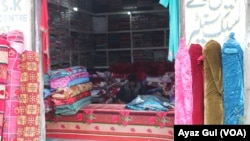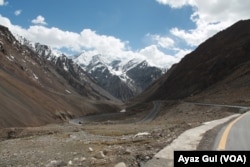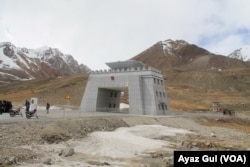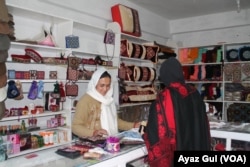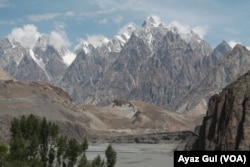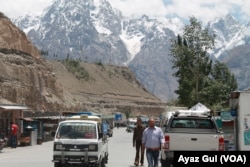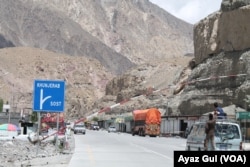China and Pakistan opened this spectacular mountain pass for tourism and limited trade back in the 1980s. The Khunjerab Pass, the world’s highest paved border crossing, is located at an elevation of more than 4,600 meters and closes for four months each year because of snow.
But this remote highway could become the linchpin of a $46 billion effort to develop trade routes that Islamabad hopes could revive its economy and boost employment, and Beijing hopes will give it a new trade route to the Middle East, Africa and Europe.
The China-Pakistan Economic Corridor, or CPEC, investment has been hailed as a “game-changer” for Pakistan, roughly equaling all of the foreign direct investment into the country since 1970.
The money will build infrastructure aimed at allowing Chinese trade convoys to travel 3,000 kilometers along the Karakoram Highway, snaking past snow-capped ranges hosting some of the highest mountains on Earth, down to central Pakistan and finally to the deep-water Gwadar port on the Arabian Sea, where ships then take the freight to markets in Africa, the Middle East and Europe.
Billions of dollars' worth of Chinese investment are aimed at constructing energy projects, building roads and rail networks, and laying modern communication lines along the CPEC route, which analysts say could mean the creation of upward of 700,000 direct jobs over the next 15 years. It will also enable China to cut drastically cut transport times for its international trade, reducing dependability on routes through the South China Sea.
The new Silk Road
The ambitious effort will effectively re-create the ancient Silk Road that for centuries linked Asia to the rest of the world.
Khunjerab means “Valley of Blood,” which locals attribute to the bandits who once preyed on caravans on what used to be one of the main crossing points on the Silk Road.
About 90 kilometers from the border crossing is Pakistan’s northernmost town, Sost, which is now often referred to as China’s new gateway to the Arabian Sea. It hosts a dry port to handle the few trucks transporting commercial goods from the Chinese city of Kashgar.
The 12-year-old facility has enabled hundreds of laborers to earn a livelihood in a region where farming and livestock are the main sources of income.
Residents, shopkeepers and activists here hope the economic expansion between Beijing and Islamabad will also bring development and jobs to their impoverished town. There is no clean drinking water available in Sost, and locals, including hotel and restaurant owners, are forced to fetch it from freshwater streams located far away, high in the mountains.
“We hope the government will now pay attention to our problems and develop Sost into a business center so it is presented to the world as a clean and transparent mirror of the CPEC, because if the mirror is not clean it will reflect a bad image of Pakistan," notes Noor Jahan, the only female selling local handicrafts among nearly 200 shops and business centers in the area.
As is the case in the rest of Pakistan, power outages are routine in the city, it has aging infrastructure, it lacks basic health and education facilities, and the government has not even deployed staff to keep streets clean and collect garbage.
“We have repeatedly raised the issue of lack of basic facilities, but to no avail. One has to be skeptical because for the past 30 years the government has not even deployed staff to clean and collect garbage in Sost,” said Lutffullah Khan, leader of local traders union.
Environmental worries
Residents in Sost and farther down in the scenic Hunza valley are also worried that the expected rise in vehicle traffic is likely to create environmental issues in an area known for some of the world’s most stunning scenery, including five of the 14 tallest mountain peaks.
Mohammad Amin, who drives tourists around, says local communities are happy about the development as long as economic uplift of the area is made the priority and locals are able to share in the benefits of the CPEC-related projects.
“But if we are deprived of the opportunity, we will not hesitate in taking to the streets and blocking the flow of traffic,” he said, blaming local political elite for indulging in corrupt practices in collaboration with the central government and not paying attention to the development and progress of the northern Pakistani region known as Gilgit Baltistan (GB).
Deeply rooted concerns about corruption allegedly plaguing the political elite in the GB are behind local skepticism.
Regional tour operator Hussain Ali says Pakistani leaders project CPEC as “a game-changer” for the region. But he says that despite being a key stakeholder, local government representatives have hardly been seen or consulted in meetings on China’s investment.
“People in our area remain clueless about what is going on and struggle to deal with a lack of basic health and education services and hours-long power outages every day,” Ali lamented.
Tariq Fatemi, a close aide to the Pakistani prime minister, says such concerns of local officials are being addressed and resolved to ensure the government moves forward on CPEC with a national political consensus.
He said work on the projects is “proceeding at a fast pace,” and he explained the cooperation with China is not meant to benefit Pakistan only, it is meant to benefit the entire region.
“We are not merely going to connect Pakistan and China through the Gwadar-Kashgar motorway. Pakistan will build the Peshawar-Kabul motorway that will connect to the Kabul-Kunduz motorway, that will then get into [the central Asian nation of] Kyrgyzstan,” said Fatemi.
Security worries
Pakistani authorities dismiss concerns that the threat of Islamist militancy and an acute energy crisis could hamper CPEC-related projects. A major portion of the $46 billion China plans to invest will be used for building power projects that are expected to add around 17,000 megawatts to the national grid.
The southern terminus of the economic corridor in Gwadar is located in southwestern Baluchistan province, where separatist attacks on government installations and religiously motivated violence have long worried authorities. A large section of the CPEC route is to pass through the violence-hit province.
The military has already deployed a specially trained force of 15,000 personnel for the protection of the projects and Chinese engineers, which it says shows how ensuring the safety of the project is of paramount importance.
“Every Pakistani considers it as a national obligation to work for the success of CPEC, and the military has already taken full responsibility for ensuring security in all areas,” said army spokesman Lieutenant General Asim Bajwa.




